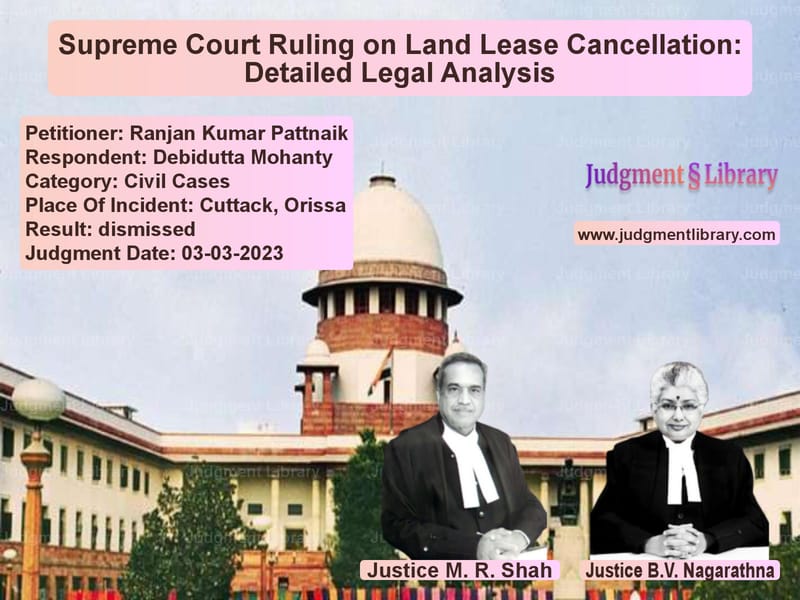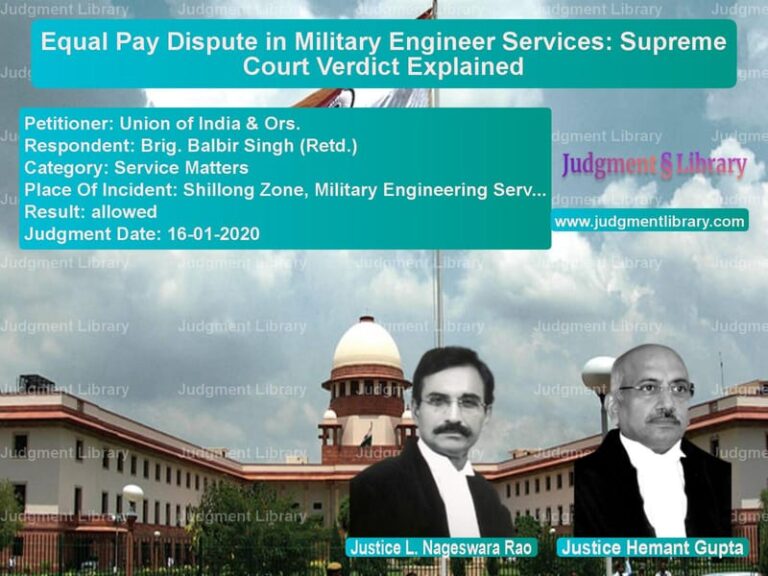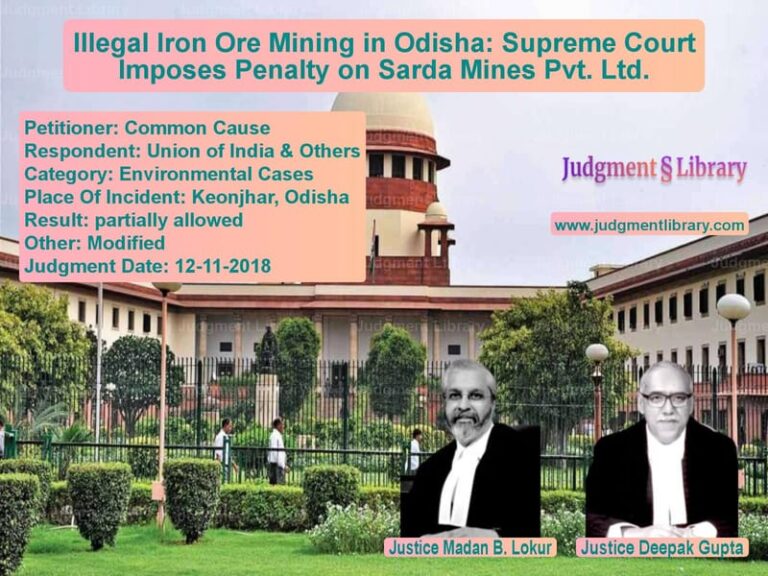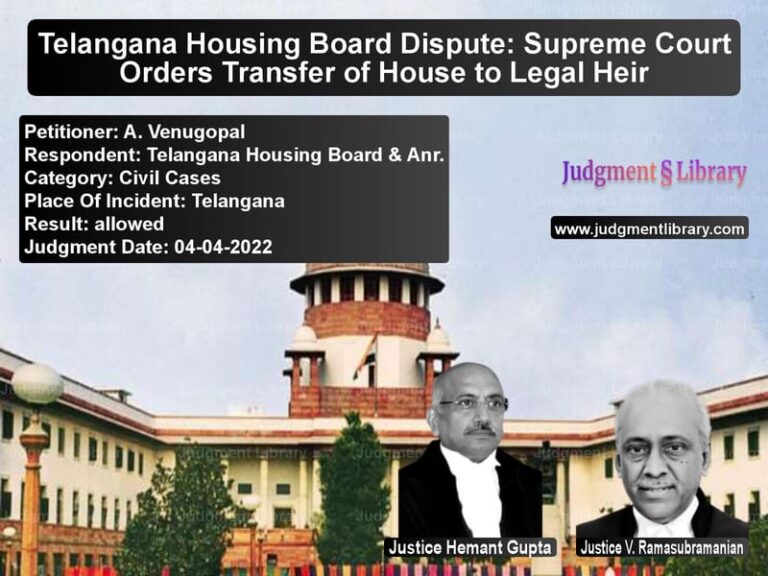Supreme Court Ruling on Land Lease Cancellation: Detailed Legal Analysis
The Supreme Court of India recently adjudicated on a contentious issue regarding land lease cancellation, where the core dispute revolved around the validity of a solvency certificate and the authority of the Collector in revoking the lease. This case highlights crucial legal principles concerning administrative discretion, the sanctity of bidding processes, and the scope of judicial review in such matters.
Background of the Case
The case originated when the petitioner, Ranjan Kumar Pattnaik, applied for a lease under the Orissa Minor Minerals Concession Rules, 2016. As part of the bid process, applicants were required to submit a solvency certificate. The petitioner initially presented a certificate issued in his personal name, even though the property in question was owned by a trust. Later, upon realizing the discrepancy, he sought to rectify it by submitting a new certificate.
The lease was initially granted, but upon further scrutiny, the Collector, Cuttack, canceled the lease deed, citing procedural irregularities. This decision was subsequently overturned by the Orissa High Court, which ruled in favor of the petitioner, prompting the present appeal before the Supreme Court.
Key Issues Before the Supreme Court
- Was the solvency certificate submitted by the petitioner valid at the time of bidding?
- Did the Collector have the jurisdiction to cancel the lease deed?
- Did the High Court err in overturning the Collector’s decision?
- Could a later correction to a solvency certificate be considered sufficient compliance?
Arguments from the Petitioner
- The petitioner contended that the initial mistake regarding the solvency certificate was a minor procedural error and should not have resulted in lease cancellation.
- He argued that he later rectified the mistake by submitting a new certificate in the trust’s name, which was in compliance with the legal requirements.
- The petitioner further claimed that the Collector did not have the authority to unilaterally cancel the lease deed and that such powers were vested only with the Tehsildar under the Orissa Minor Minerals Concession Rules.
- He also pointed out that other similarly placed applicants were not subjected to such rigorous scrutiny, raising concerns of arbitrary administrative action.
Arguments from the Respondents
- The State argued that the submission of an incorrect solvency certificate was a serious irregularity that could not be rectified after the bidding process had been completed.
- The respondents contended that allowing such post-bid corrections would lead to legal uncertainty and encourage fraudulent practices.
- The State defended the Collector’s action by stating that administrative authorities must have the power to review and cancel improper grants to prevent misuse of public resources.
- They further asserted that judicial interference in such matters should be limited to cases where clear mala fides or jurisdictional errors were established.
Supreme Court’s Observations
The Court took into account multiple legal precedents and statutory interpretations to arrive at its conclusion.
Validity of the Solvency Certificate
The Supreme Court found that the solvency certificate submitted at the time of bidding was indeed invalid. The petitioner had originally applied in his own name, despite the fact that the property belonged to the trust. The Court noted:
“The petitioner, with full knowledge of ownership details, proceeded to obtain and submit a certificate in his personal name. This act vitiates the bid process.”
Authority of the Collector
On the issue of whether the Collector had the authority to cancel the lease, the Court ruled that the Collector was acting under the directions of the High Court and within the framework of statutory rules. The bench stated:
“The Collector’s role in supervising and ensuring compliance with lease conditions is well established under administrative law. The power to cancel a lease granted under procedural irregularity remains inherent in the executive authority.”
Precedent on Post-Bid Corrections
The Supreme Court also examined precedents where post-bid modifications were disallowed. Citing previous rulings, the bench observed:
- In State of Haryana v. Mohinder Singh, the Court held that documents submitted at the time of bidding must be final and binding.
- In Avtar Singh v. State of Haryana, it was ruled that later corrections cannot be used to cure fundamental defects in tender applications.
- In Rohan Dhungat v. State of Goa, the Court reaffirmed that fairness in public procurement requires strict adherence to the original submission criteria.
Final Judgment
The Supreme Court overruled the High Court’s judgment and upheld the Collector’s decision to cancel the lease. The Court’s key findings were:
- The petitioner’s initial solvency certificate was defective and could not be retrospectively rectified.
- The Collector was within his jurisdiction to cancel the lease deed.
- The High Court erred in reinstating the lease by disregarding the statutory requirements.
- Post-bid alterations in critical documents such as solvency certificates would render the tender process arbitrary and unfair.
Impact of the Judgment
- Ensuring Integrity in Public Bidding: The ruling underscores the necessity of submitting correct documents at the time of bidding, reinforcing transparency in public contracts.
- Strengthening Administrative Authority: It affirms the discretionary power of executive authorities in reviewing and rectifying errors in lease grants.
- Legal Precedent: This judgment will serve as a guiding principle for future disputes concerning public bidding and lease allocations.
Conclusion
The Supreme Court’s decision in Anil Kumar v. State of Haryana reaffirms that procedural integrity must be maintained in all government lease allocations. The judgment ensures that leaseholders comply strictly with the requirements at the time of bidding and do not seek post-facto rectifications. By upholding the Collector’s decision to cancel the lease, the Court has reinforced the fundamental principles of fairness, transparency, and accountability in public transactions.
Petitioner Name: Ranjan Kumar Pattnaik.Respondent Name: Debidutta Mohanty.Judgment By: Justice M. R. Shah, Justice B.V. Nagarathna.Place Of Incident: Cuttack, Orissa.Judgment Date: 03-03-2023.
Don’t miss out on the full details! Download the complete judgment in PDF format below and gain valuable insights instantly!
Download Judgment: ranjan-kumar-pattnai-vs-debidutta-mohanty-supreme-court-of-india-judgment-dated-03-03-2023.pdf
Directly Download Judgment: Directly download this Judgment
See all petitions in Contract Disputes
See all petitions in Property Disputes
See all petitions in Judgment by Mukeshkumar Rasikbhai Shah
See all petitions in Judgment by B.V. Nagarathna
See all petitions in dismissed
See all petitions in supreme court of India judgments March 2023
See all petitions in 2023 judgments
See all posts in Civil Cases Category
See all allowed petitions in Civil Cases Category
See all Dismissed petitions in Civil Cases Category
See all partially allowed petitions in Civil Cases Category







